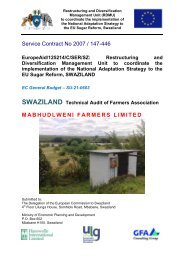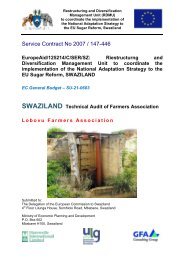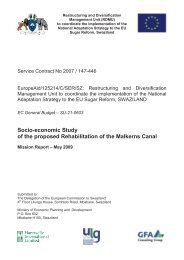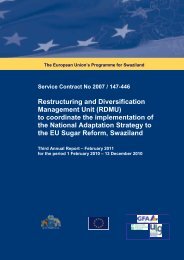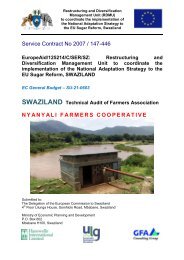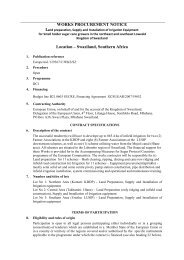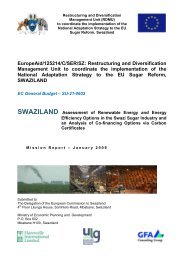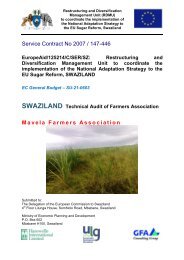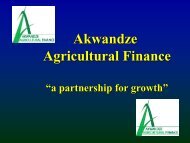Service Contract No 2007 / 147-446 Strategic ... - Swaziland
Service Contract No 2007 / 147-446 Strategic ... - Swaziland
Service Contract No 2007 / 147-446 Strategic ... - Swaziland
- No tags were found...
Create successful ePaper yourself
Turn your PDF publications into a flip-book with our unique Google optimized e-Paper software.
Policy, Plan orProgrammeNational Report onClimate Change (FirstNational Communicationto the UNFCCC)National Food SecurityPolicy for <strong>Swaziland</strong>(2005)Poverty ReductionStrategy and Action Plan(PRSAP)Strategy Brief for NationalFood Security andAgriculture DevelopmentHorizon 2015 (2005)Description / relevance to the NASFirst report from the GoS to the UNFCCC secretariat in compliance withthe Convention. It contains, apart from a general overview of the country,an inventory of greenhouse gases, an analysis on the country’svulnerability to climate change and foreseen adaptation measures, anindication of mitigation measures (reduction of GHG emission) and areview of relevant policies and measures.Widespread poverty and food insecurity are a major concern for thegovernment; the Policy thus looks at the means of attaining food securityand reducing poverty.The Policy was drafted under the guidance of the Food Security TaskTeam, established under the Consultative Committee on Food Security, across-sectoral committee with representatives from government, NGOs,the private sector and other stakeholders – the Ministry of Agriculture(MOA), the United Nations Development Programme (UNDP), the FAO(Food and Agriculture Organisation of the United Nations), NERCHA, andthe <strong>Swaziland</strong> Farmers and Development Foundation (SFDF).The revised 2005 draft PRSAP presents a poverty reduction frameworkwhich consists of six pillars: (1) rapid acceleration of economic growthbased on broad participation; (2) empowering the poor to generateincome and reduce inequalities; (3) fair distribution of the benefits ofgrowth through public expenditure; (4) ensuring food security; (5)improving the quality of life of the poor; and (6) strengthening goodgovernance.The most essential parts of the PRSAP are consolidated under theempowerment of the poor to generate income through: i) improvingaccess to land, ii) increasing income from agriculture, and iii) reducingunemployment. As poverty is more prevalent in rural areas, smallholderirrigation development is regarded as vital to its alleviation.The strategies proposed under human capital development focus oneducation, health, food security and nutrition, and safe water andsanitation.Implementation of the PRSAP seen as crucial in achieving the goals ofthe National Development Strategy (NDS).Prepared by the FAO and the MOA, the Brief represents an initial step inthe process of developing a national food and agricultural strategy toenable the country to fulfil its obligations to the WFS commitments andFAO support to it – for support to longer term processes to upgrade foodand agriculture policies in line with the NDS.The Brief looks at priority areas and actions/strategies from 2006-2015, inparticular to achieve the Millennium Development Goals (MDGs). Theseinclude: the expansion of areas under sustainable land management andreliable water control systems; the improvement of rural infrastructure andtrade-related capacities for improved market access, enhancement offood supply, and reduction of hunger; the development of agriculturalresearch, technological dissemination and adoption, to sustain long-termproductivity growth; and the integration of livestock, fisheries, forestry andthe environment in agricultural development.RDMU (<strong>Strategic</strong> Environmental Assessment of the National Adaptation Strategy) - Page 157



